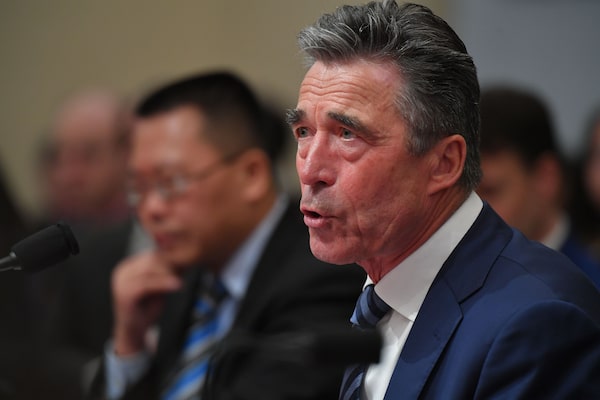
In an interview with The Globe and Mail, former NATO secretary-general Anders Fogh Rasmussen, seen here on Feb. 26, 2019, said it is only a matter of time before voters are faced with fraudulent videos that are nearly impossible to distinguish from reality.MANDEL NGAN/AFP/Getty Images
Canada’s three main parties are signing on to a global pledge against the use of fake news and digital dirty tricks in advance of the October federal election campaign.
A former head of NATO met with MPs and government officials on Monday on Parliament Hill to gather signatures for an “election integrity” pledge that started in the European Union and is now being promoted in Canada and the United States.
Signatories agree to reject the increasingly sophisticated tools that can be used to mislead voters during an election.
That list includes “deep fakes,” an artificial-intelligence technology based on doctoring video and audio in ways that produce believable, yet fake, clips of politicians appearing to say something that they never did.
In an interview with The Globe and Mail, former NATO secretary-general Anders Fogh Rasmussen said it is only a matter of time before voters are faced with fraudulent videos that are nearly impossible to distinguish from reality.
“In a couple of years, you’ll have a perfect technology where you’re not able to identify with your own eyes and ears who is the fake and who is the true edition of a political leader,” he said. “You can imagine if a deep-fake video, for instance, is published a couple of days before an important election [what] damaging effect it could have.”
Mr. Rasmussen was in Ottawa on Monday to meet with federal officials in his role as the founder of the Alliance of Democracies Foundation. The foundation is urging political party leaders and candidates to sign a Transatlantic Commission on Election Integrity pledge.
While in Ottawa, he met with Democratic Institutions Minister Karina Gould and Shelly Bruce, chief of the Communications Security Establishment, the federal cybersecurity spy agency. The CSE recently issued a report warning that foreign interference is “very likely” to take place in connection to the 2019 federal election campaign.
Specifically, signatories must pledge “not to fabricate, use or spread data or materials that were falsified, fabricated, doxxed or stolen for disinformation or propaganda purposes," it states.
The term “doxxed” generally refers to publishing personal details about an individual without their approval, which could include information stolen via a computer hack.
Signatories must also pledge not to use doctored audio and video, take active steps to maintain cybersecurity and commit to transparency about the sources of campaign finances.
The campaign already has signatories from parties across Europe, and Mr. Rasmussen and his colleagues are now focused on persuading Canadian politicians to sign on before the October, 2019, federal election.
Conservative Leader Andrew Scheer said in a statement that his party welcomes the work being done by the Transatlantic Commission.
“Canada’s Conservatives are committed to ensuring that Canadian elections are protected from foreign interference,” he said. "I am proud to sign this pledge and will continue to work to protect Canadian democracy.”
NDP Leader Jagmeet Singh also signed the pledge on Monday.
“The NDP believes that transparency, as well as reliable and verifiable information, is key to strengthening our democracy. We are committed to fight disinformation and misleading claims whenever and wherever they arise," NDP spokesman Guillaume Francoeur said in an e-mail.
Amy Butcher, a spokeswoman for Ms. Gould, the Democratic Institutions Minister, said that while Prime Minister Justin Trudeau was out of town on Monday, the government supports the campaign and the Liberals will be signing the document.
“The minister supports the pledge and is pleased that this issue has received bipartisan support,” she said in an e-mail.
The Alliance is also seeking American pledges in the run-up to the 2020 presidential election. Former U.S. vice-president Joe Biden was a keynote speaker for the campaign at its first meeting in 2018, in Copenhagen. Mr. Biden announced last week that he is entering the race to represent the Democratic Party in the 2020 presidential race.
The Alliance is a non-profit organization that has received funding from democratic governments, including Canada, as well as large tech companies including Facebook and Microsoft. The Canadian funding supported the Alliance’s role in monitoring the recent Ukrainian presidential election.
 Bill Curry
Bill Curry